Human, Monkey, Rabbit, Cat, Mouse, Rat, Pig, Chicken, and Cow (-) Anti-MUC5AC Antibody Product Attributes
MUC5AC Previously Observed Antibody Staining Patterns
Observed Antibody Staining Data By Tissue Type:
Variations in MUC5AC antibody staining intensity in immunohistochemistry on tissue sections are present across different anatomical locations. An intense signal was observed in respiratory epithelial cells in the bronchus, glandular cells in the cervix, uterine, respiratory epithelial cells in the nasopharynx and glandular cells in the stomach. More moderate antibody staining intensity was present in respiratory epithelial cells in the bronchus, glandular cells in the cervix, uterine, respiratory epithelial cells in the nasopharynx and glandular cells in the stomach. Low, but measureable presence of MUC5AC could be seen in. We were unable to detect MUC5AC in other tissues. Disease states, inflammation, and other physiological changes can have a substantial impact on antibody staining patterns. These measurements were all taken in tissues deemed normal or from patients without known disease.
| MUC5AC General Information | |
|---|---|
| Alternate Names | |
| Mucin 5AC, Muc5AC, MUC5AC | |
| Molecular Weight | |
| >1,000kDa | |
| Chromosomal Location | |
| 11p15.5 | |
| Curated Database and Bioinformatic Data | |
| Gene Symbol | MUC5AC |
| Entrez Gene ID | 4586 |
| Ensemble Gene ID | ENSG00000215182, ENSG00000283158 |
| RefSeq Protein Accession(s) | NP_001291288 |
| RefSeq mRNA Accession(s) | NM_017511, NM_001304359 |
| RefSeq Genomic Accession(s) | NW_015148966, NC_000011, NC_018922 |
| UniProt ID(s) | P98088, Q7M4S5 |
| UniGene ID(s) | P98088, Q7M4S5 |
| HGNC ID(s) | 7515 |
| Cosmic ID(s) | MUC5AC |
| KEGG Gene ID(s) | hsa:4586 |
| PharmGKB ID(s) | PA31321 |
| General Description of MUC5AC. | |
| This MAb recognizes the peptide core of gastric mucin M1 (>1,000kDa) (recently identified as Mucin 5AC). Its epitope is destroyed by beta-mercaptoethanol, proteases but not by periodate treatment. Antibody to gastric mucin M1 reacts with the gastric epithelium of normal human gastrointestinal tract as well as with the precancerous, cancerous colon but not with normal adult colon. It also reacts with fetal colonic mucosa. Resurgence of gastric mucin reactivity during colonic carcinogenesis is due to re-expression of the peptide core of gastric (or fetal colonic) mucins. | |

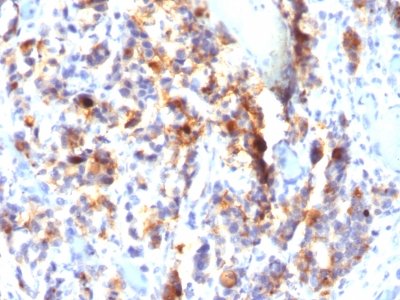

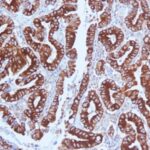
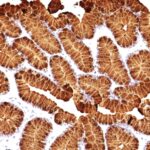
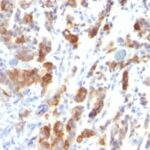
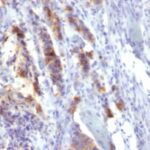
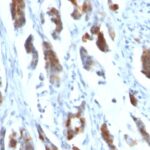
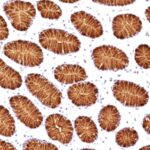
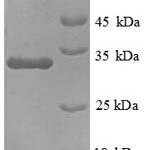

There are no reviews yet.